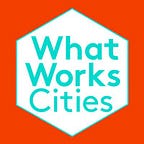The What Works Cities Economic Mobility Initiative
Learn the basics of What Works Cities’ Economic Mobility work with nine American cities
Launched in June 2019, the What Works Cities (WWC) Economic Mobility initiative aims to address the strong demand among local leaders for effective ways to respond to national trends in rising income inequality and declining economic mobility.
The following cities were selected to participate in the 18-month initiative through a rigorous application process: Cincinnati, OH; Dayton, OH; Detroit, MI; Lansing, MI; New Orleans, LA; Newark, NJ; Racine, WI; Rochester, NY; and Tulsa, OK.
Each participating city is identifying, piloting, and measuring the success of a local strategy that is designed to accelerate economic mobility for its residents.
What Does Each Participating City Receive?
- Flexible funding and expert support to develop, test, and evaluate the early impact of a locally-led pilot program;
- Technical assistance from WWC partner organizations to grow the city’s capacity to use data more effectively and pilot innovative approaches to increase economic mobility;
- Access to a professional network of colleagues from cities who are committed to sharing lessons from their pilot interventions; and
- A platform to share what they have achieved and learned with their residents and with leaders and communities nationwide.
What Do We Expect to See When the Initiative Ends in Winter 2020?
- Progress made on short-term indicators of improving economic mobility for participating cities’ residents;
- Cities using data and evidence to make decisions that promote economic mobility; and
- An improved understanding of what works to improve economic mobility through local government and community partners.
Who are the WWC Partner Organizations Supporting this Initiative?
Launched in 2015, the What Works Cities initiative is a national collaborative of five partner organizations — Results for America, the Behavioral Insights Team, the Center for Government Excellence at Johns Hopkins University, the Harvard Kennedy School Government Performance Lab, and the Sunlight Foundation — that helps cities tackle their most pressing challenges and improve residentsʼ lives by building their capacity and skills to use data and evidence in decision-making.
Results for America is managing the Economic Mobility initiative, and the Behavioral Insights Team is providing technical assistance to the cities and their partners for their pilot projects. Each participating city is matched with at least one of the five WWC partner organizations to help them achieve citywide economic mobility goals by growing their capacity to use data more effectively.
In addition to the support offered through WWC, Opportunity Insights, a non-profit organization that conducts scientific research on economic mobility over time and place to inform policy and program decisions, is providing the nine cities with tailored data analysis and advisory support.
The What Works Cities Economic Mobility Initiative is made possible by the generous support of Bloomberg Philanthropies, the Bill & Melinda Gates Foundation, and Ballmer Group.
